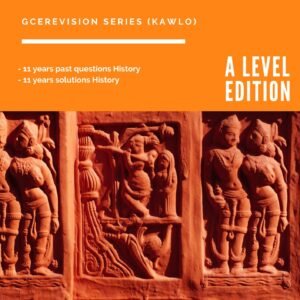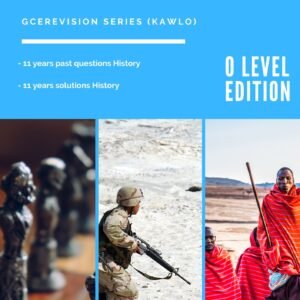G.C.E O/L HISTORY 2016 PAPER 2
| Two and a half hours
Answer FOUR questions. TWO questions must be chosen from SECTION A, ONE from SECTION B and ONE other from SECTION C. One of the two questions chosen from SECTION A must be a Starred question. Maps should be used to illustrate answers where appropriate. All questions carry equal marks. You are reminded of the necessity for good English and orderly presentation in your answers. |
|---|
SECTION A
CAMEROON SINCE 1884
Answer TWO questions from this section. Answer 1A* or 1B* and any other question from this section.
1 A* Study these two extracts concerning the scramble of Cameroon and the establishment of a German
Protectorate in Cameroon from 1850 -1916 and then answer questions (a-d) which follow. (The maximum
mark for each sub-question is indicated in the brackets).
Extract I
—- By the 1830’s and 1840’s, British traders, missionaries and consuls had explored the interior of the
coastal areas along the Bight of Benin and Biafra, up to the extent that the British consuls had established a
“Court of Equity” in 1856 at Douala to regulate trade, trade disputes and commercial activities among the
different European nationals and the natives doing commercial business along the Cameroon Coast——-
In fact, in 1858, the British Christian mission group —- had established the first permanent European
colonial settlement at Victoria at the foot of mount Cameroon.—- 5
The extent of British influence along the Cameroon Coast at Douala and in the Gulf of Guinea was so
strong that couple with repeated demands from the various coastal chiefdoms for British protection from
the 1870s onwards, made annexation of the area by Britain seem a foregone conclusion—–
——- However, this conclusion was not shared by other European competitors for the Cameroon trade
——- By 1884, Britain was shocked that a rival European country had worked out annexation treaties with
the Douala kings and the king of Bimbia.
Extract II
The German protectorate of Kamerun lasted ———–for 30 years under a succession of German colonial governors
whose administrative activities with their individual temperament or behaviour and attitude towards the Cameroonian natives
varied. However, they all considered the native Cameroonians primitive, backward and uncivilised, who had to be schooled
to accept Western civilisation —
In 1911 the German protectorate was extended and almost doubled in size to include parts of Chad, Ubangi – Shari, Moyenne
Congo and Gabon in return for the withdrawal of German imperial interest in Morocco but this arrangement was short
lived —-
—– By 1914, German colonial administration had laid the foundation of a modem Cameroon setting
—– by providing basic transportation, communication and port facilities to promote trade with the interior,
railway lines, bridges, roads, paths and well constructed private and public buildings, some which have become
historical monuments today. However, in the assessment of German rule —————-other economic development
projects cannot be overlooked for it remains the main stay and life wire of the Cameron economy today —
—– By 1916 German exit from their Kamerun Protectorate was evident but Pan Cameroon nationalism today
still traces its roots from this exit.
(a) (i) Name any two British trading firms which were carrying out commercial activities
along the Cameroon coast and resident in Douala or Bimbia from 1840 onwards as indicated in line… 1 in
Extract I
(ii) Identify the British Christian missionary body and its leader who established the first permanent European
colonial missionary settlement in Victoria in 1858 as in line… 5 Extract I
(iii) Give the name of any British consul who was very active in regulating, trade along the
Cameroon coast during this period. (2+2+l)marks
(b) (i) Identify the names of any two Cameroon Chiefdoms and their rulers who demanded for British
protection between 1879 and 1884 as in line…8 in Extract I (ii) Why was Britain shocked that by
1884 she could no longer annex some coastal chiefdoms
despite repeated appeals from them? (2+3) marks
(c) (i) Write down the exact dates when German administration of Cameroon officially began with
the arrival of the first Governor and when it ended with the exit of the last German
Governor.
(ii) Who was the first German Governor in the Cameroon protectorate? State two main activities
he carried out to establish German rule. (2+3) marks
(d) (i) State the name of any two famous German public monuments or buildings found in Buea or
elsewhere in the territory not mentioned in Extract II.
(ii) Describe the importance of the most famous economic project— (the plantations), the
Germans left behind to the people in Cameroon not mentioned in Extract II. (2+3)marks
2. Why was the First World War extended or fought in Cameroon?
What was the immediate political outcome of the war on Cameroon and Cameroonians from (1914 to 1924)?
(8/12 or 8/6/6) marks
3. What were the causes of the U.P.C revolt in French Cameroon in the 1950’s? Show how the U.P.C revolt contributed to the
French granting independence to French Cameroonians by 1960s.
(10/10) marks
4. Write a brief historical essay on the career and contributions of any two of the following Cameroonian leaders in the building
of a modern democratic state for Cameroon from 1985 to 2004.
(a) Paul Biya
(b) John Fru Ndi
(c) Peter Mafany Musonge
(d) Achidi Achu
(10/10 or 5/5/5/5) marks
SECTION B
AFRICA SINCE 1884 (Excluding Cameroon)
Answer ONE question from this Section
5. What were the main causes of the scramble for Africa by 1879? Outline the main features of the partition of Africa from 1884
to 1900.
(12/8) marks
6. What do you understand by African Nationalism? Describe the factors which promoted the growth of
Nationalism in the Gold Coast. What role did Nkwame Nkrumah and his CPP party play in the attainment of the
independence of that country from 1949 to 1957?
(5/8/7) marks
7. In which ways did the Belgians failed to prepare adequately the people of the Congo for independence by 1960? Why did a
civil war break out in the Congo in the 1960s? What was the contribution of the U. N. O in bringing the civil war to an end?
(6/7/7) marks
SECTION C
WORLD DIPLOMACY SINCE 1870
Answer ONE question from this Section
8. What were the main objectives of the Bismarckian foreign policy from 1871 to 1890? Describe how Bismarck involved
European powers in an alliance system from 1879 – 1890 and explain why Germany abandoned the policy by 1894. (7/6/7)marks
9. Outline the main causes of the First World War. What were the provisions of the Versailles treaty of 1919?
(12/8) marks
10. Choose any four of the following U.N specialized agencies, and outline the activities and its benefits to humanity.
(a) FAO
(b) WHO
(c) ILO
(d) UNESCO
(e) UNICEF
(f) UNHCR
(g) IBRD (World Bank)
(5/5/5/5) marks















Enstine
February 19, 2018
Pleas try to provide answers for each question so it can be more helpful than it is now.......this site is very helpful tanks @©®
MUAM EDWIN
January 27, 2019
I'm a pationate maths holder who completed gces in 2014, i've just had my degree in electrical engineering. i'm in yaounde and i'm ready to offer my services as a teacher/mentor here in yaounde. apart from teaching maths, i can also handle physics and chemistry. for now, i prefer to handle o level candidates only. contact me either through 676711589 or my email if you are interested in my services.
Shuland
March 16, 2020
Provide answers for the question that’s what we want plssssss
Jelinda
November 17, 2020
Answers plis that's what I want
Wirgham christer Kidze
April 22, 2023
Please for past GCE question on history from 2015 -2022 and answers provided please